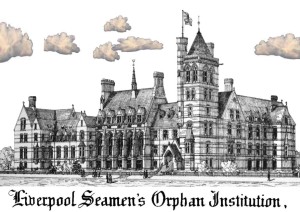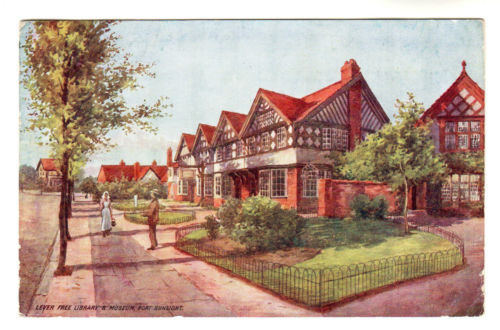Agnes Cowper (1874-1963): Life and Labour
Agnes Cowper grew up in the City of Liverpool with her childhood spent amongst seafaring families like her own. A Backward Glance on Merseyside, Agnes’s autobiography, provides a glimpse into the community of these families. With her father, Matthew Cowper, being a Commander in the R.N.R., Agnes gives the sense that his occupation was not only his job but who he and his family were.
Agnes’s autobiography begins with entries from her mother’s own diary from the year 1874 when she and her son Willie accompanied Matthew on a journey across the Atlantic to New Orleans. Agnes’s mother wrote:
March 27th – I fear another storm is coming. All day it has blown with great violence, and has taken two men, lashed to the wheel, to steer the ship. The wind is now increasing in fury, while the sea is dreadful to look upon… I must conclude, for every moment I am in danger of having my bones broken against the bulkhead.
Being a part of a seafaring family brought the danger of sea deaths. Matthew Cowper was lost at sea in 1895 when his ship foundered at the Manacles during dense fog. Although some bodies were washed ashore, Agnes’s father was not.

These deaths were sadly not uncommon. Agnes recalled a family whom after the tragic death of the youngest child, accompanied the father on one of his voyages. On the return journey home, their ship sank and the family was lost. Their two eldest sons who had remained at home with their grandmother were admitted to the Liverpool Seaman’s Orphanage. Agnes’s own brother Harry, was also taken in by the orphanage when Matthew Cowper died.
Despite the dangers presented by working at sea, Agnes’s older brother Willie dreamed of following in his father’s footsteps. When Willie was fourteen he wanted to leave school to work and earn. It was Matthew’s intention to let his boy be apprenticed with on of Liverpool’s sailing-ship companies in another twelve months, until then Willie was to take up any suitable temporary employment. For about six months Willie worked as a junior assistant at the Liverpool Free Library earning five shillings a week which he would present to his mother:
On arriving home Willie presented his cap containing the treasure. Mother, with an air of mock seriousness, appeared overcome with this great addition to her income, and I know both Willie and I wondered how she would be able to spend so much wealth.
When Willie was just fourteen and a half, he consented to what was known as a ‘Pier Head Jump’. One day, Willie went to wish a school friend farewell on his first voyage. Some of the crew had not turned up and Willie was asked to join them. He had agreed to partake in an Atlantic crossing wearing only the clothes he stood up in when being questioned at the docks.
A few months later he returned and held out his hand to his mother in which was his earnings. On the evening of his arrival the family sat around and listened ‘spellbound as our hero related the perils, hardships and pleasures of his first voyage’. On his second voyage, Willie was blinded in one eye and this affected his career for the rest of his life as he had now become an unfit member of the crew.
Unlike her brother Willie, when Agnes left school her job was in the home where she would help her mother raise the children and with the upkeep of the house. After the death of her father, money was tight and Agnes needed to seek employment. Her attempts to gain employment was met with ‘repeated failure and disappointment’. She would walk into the city daily and stand in a long line of applicants to apply for jobs.
After around two months, Agnes was finally employed as an assistant in the Glass and China Department of a well known store within the city. She began working for eight shillings a week and a commission of threepence in the pound on all her sales, plus her lunch and dinner. Agnes worked with another woman who was ‘first sales’. As there was only two members of staff, unless there was more than one customer is was hard for Agnes to make commission as all sales would go through the ‘first sales’.
After eighteen months of working in the store, Agnes was told that her services were no longer required. Two days before she had served a man and woman who claimed that they would pay for their item upon it’s delivery. Despite putting the bill through the proper procedure, the customer claimed that he paid on purchasing the item. Despite being dismissed, Agnes was pleased to leave the shop life, describing it as the least pleasant and most unsatisfactory of her career.
In 1906, at the age of thirty two, Agnes joined the enterprise of Lever Brothers Ltd. She was appointed a ‘modest’ position in the Head Office at Port Sunlight. Each morning Agnes would travel to work using the steamer to New Ferry, arriving at work for at 8 a.m. Agnes described her work as interesting although they were subject to strict discipline. After five years of working happily with Lever Brother Ltd. Agnes was made a co-partner and received her first shares in a company.

Agnes was later given charge of the Lever Library. The library was a scheme of the organisation’s aimed at evolving the social interests of its many employees. Of her work there Agnes wrote:
As the human element has been and always will be the most interesting study on this planet it gave to my work a fascination which, with every respect, I had never known in the world of ledgers, files and typewriters. It has been a source of contentment to have spent the best years of my life in a type of activity which has brought me into direct contact with a variety of people.
Resources and Links
- Collard, Ian. Liverpool City Centre through time. Amberley Publishing: Liverpool, 2011.
- Milne, Graeme J. Trade and Traders in Mid-Victorian Liverpool: Mercantile Business and the Making of a World Port. Liverpool: Liverpool University Press, 2000

Leave a Reply